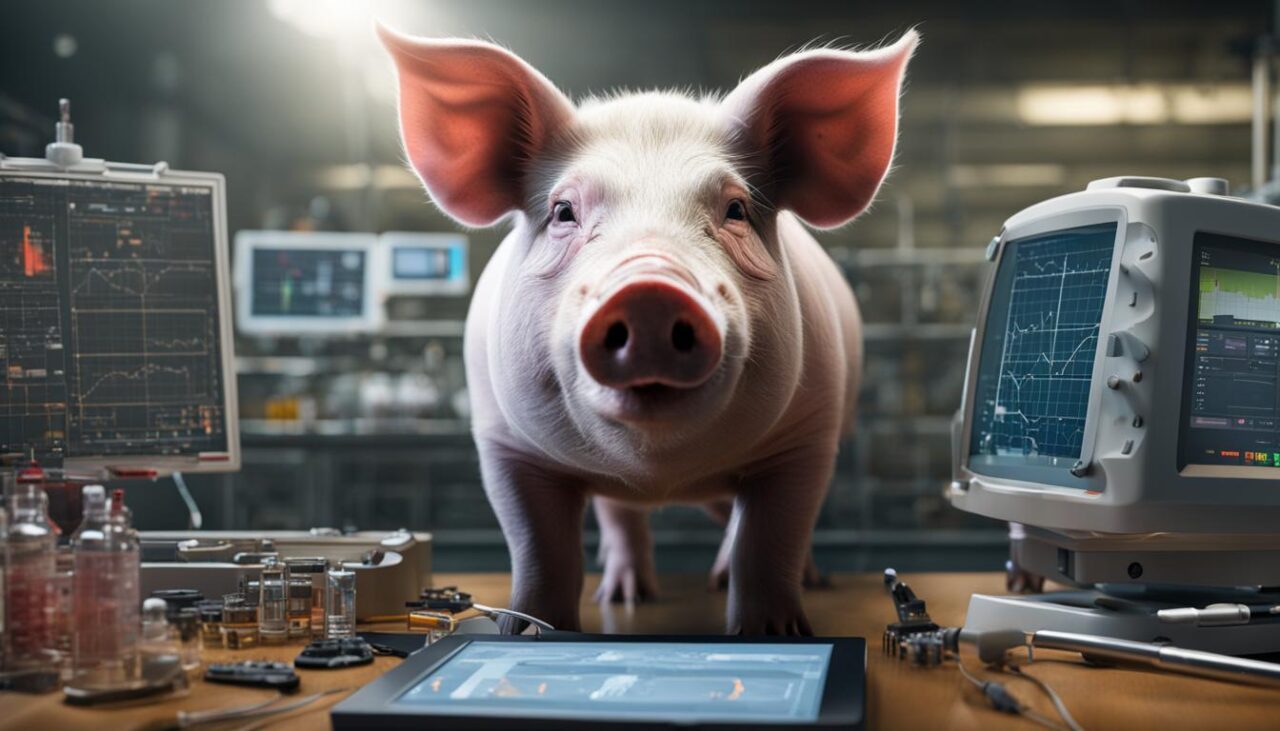Recent scientific studies and observations have revealed remarkable discoveries about animal intelligence and natural instincts. Through animal behavior research, we can gain a deeper understanding of the intricate and fascinating behaviors exhibited by a range of animals, including pigs. Groundbreaking studies exploring the behaviors of pigs and other animals have revolutionized our understanding of animal intelligence and behavior.
Key Takeaways:
- Animal behavior research provides valuable insights into the intelligence and natural instincts of animals.
- Groundbreaking studies have revealed fascinating findings about pig behavior through behavioral science research.
- Research findings have important implications for animal welfare and husbandry practices.
- Ethology, the study of animal behavior in their natural habitats, provides valuable insights into the instincts and behavioral patterns of various wildlife species.
- Through further exploration of animal behavior research, we can continue to advance our knowledge of animal behavior and improve conservation efforts.
Uncovering Intriguing Insights into Pig Intelligence
Pigs are widely considered as one of the smartest animals, and recent research has provided evidence to support this assertion. Researchers in the field of behavioral science have conducted extensive studies on pig behavior, uncovering fascinating findings about their cognitive abilities, problem-solving skills, and social dynamics.
One study found that pigs have the ability to understand symbolic representations, such as associating images with food rewards, a crucial component of problem-solving. Another study revealed that pigs could use mirrors to locate food, demonstrating their self-awareness. These findings challenge long-held beliefs about pig intelligence and suggest that they have complex cognitive abilities similar to those observed in non-human primates.
This research also has significant implications for animal welfare and husbandry practices. By recognizing the intelligence of pigs, we can improve their living conditions and ensure that they are treated more humanely. By promoting ethical treatment of pigs, we can improve the quality of pig products and enhance the reputation of the pig farming industry.

“Pigs have long been underestimated in terms of their intelligence and problem-solving abilities. However, the recent research findings on their cognitive abilities have questioned these long-held beliefs. We need to re-examine our assumptions about pig intelligence to ensure that we treat them ethically and with the respect that they deserve.”
Exploring the Instincts of Wildlife through Ethology

Ethology, the study of animal behavior in their natural habitats, provides valuable insights into the instincts and behavioral patterns of various wildlife species. Through wildlife observation and careful analysis, researchers have gained a deeper understanding of how animals interact with their environment, communicate, and survive in the wild. By observing animals in their natural habitats, researchers are able to gain a more accurate understanding of their behaviors and natural tendencies.
“Through ethology, we learn how animals live and experience the world around them. By studying animal behavior, we can gain insights into how they interact with each other and their environment, as well as how they survive in the wild.”
Notable Ethological Studies
One such study is the long-term research conducted on chimpanzees by primatologist Jane Goodall. Through her extensive observations, Goodall discovered that chimpanzees have complex social structures and unique personalities. She also observed tool use, a behavior previously thought to be exclusive to humans.
In another ethological study, researchers observed the hunting behavior of killer whales in the waters near Vancouver Island, Canada. Through their observations, the team discovered that the killer whale pods worked together to catch prey, with some whales herding fish into a tight group while others would slap their tails against the water to stun the fish before attacking.
These studies and others like them provide valuable insights into the behaviors and adaptations of different animal species, informing conservation efforts and shaping our understanding of the natural world.
Conclusion
To conclude, animal behavior research has facilitated a greater understanding of the complex and fascinating behaviors exhibited by pigs and numerous other animals. Through a combination of scientific studies and wildlife observation using ethology principles, researchers have uncovered remarkable insights into animal intelligence and natural instincts. The research findings have highlighted the cognitive abilities, problem-solving skills, and social dynamics of pigs, providing valuable information for improving animal welfare and husbandry practices. Additionally, behavioral science studies have revealed intriguing results, and research has implications for the conservation of species and their natural habitats.
By continuing to explore these research findings, we can further enhance our knowledge of animal behavior, leading to improved animal welfare, conservation efforts, and a greater appreciation of the natural world.







